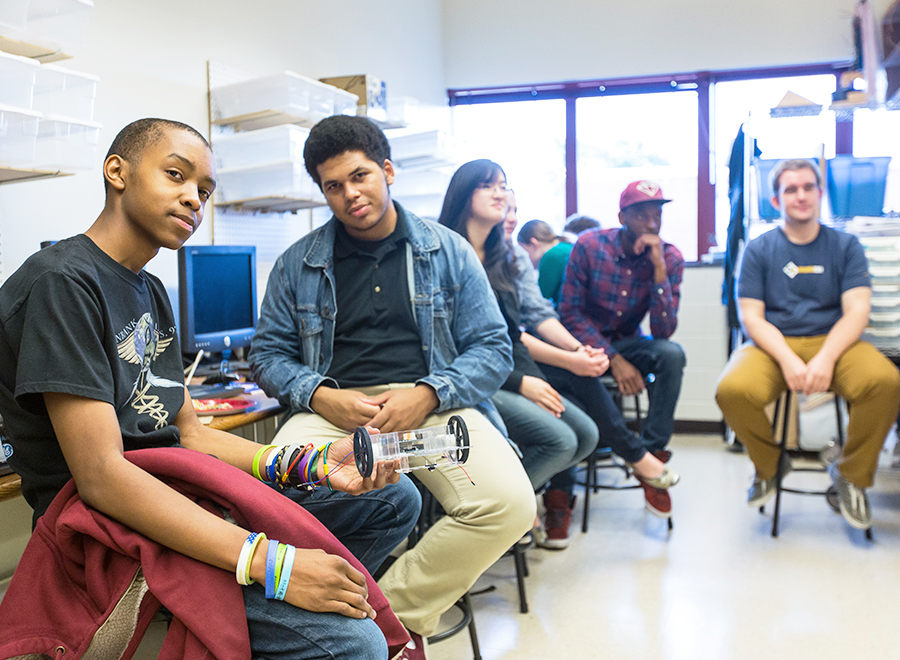
Trials and Triumphs: Here is What We Learned About Trying to Expand Access to Computer Science Education in Atlanta in One Year
The school year is wrapping up, which means that we are finishing out year one as Constellations Fellows. Phew, what a ride it has been. A ride we wouldn’t trade for anything. However, we would be lying if we didn’t say that this first year has been a breeze.
For anyone who has had a job in education, the first year can be challenging and full of unexpected surprises. It’s a year full of growth, adjusting your sails, and teamwork.
As we clean out our classrooms and send our kids off for exciting summers, we wanted to take a moment to look back on this year, the lessons we’ve learned, the victories we’ve had, and some not-so-pretty moments that we experienced. We feel that it’s important to be transparent and honest about our experiences, in order to reflect on how we’ve grown and perhaps help others in their teaching journeys. Things worthy of change are never easy, and we hope that these insights offer encouragement.
We are grateful for this first year and for all of the support we have received from within Georgia Tech and beyond. It was tough, but we already can’t wait for August.
What is something that you have learned as a Constellations Fellow while working with teachers at our partner schools over the year?
Terry Foster: During my first year as a Constellations Fellow, I’ve learned to appreciate the time allotted for planning with each teacher. There are many dynamics within a high school that prevent the teacher from meeting with a fellow as often as we’d like to. Taking advantage of the times that are available is paramount.
Another realization that came to light was redirecting our focus on vetting curriculum that is already available versus creating curriculum. In a perfect world where there is a plethora of human capital (4 or 5 fellows), I believe we could effectively create our own AP CSP, AP CSA, and Python courses. However, given our lack of resources and the large amounts of time spent commuting to the various schools, it isn’t ideal to take on that task at the moment. I believe for a fellow to be effective and for the center itself to scale, it is important that the role of the fellow evolve from being the main source of the curriculum into identifying curriculum that is tried and true and leveraging said curriculum, along with hands-on activities, to foster relationships with teachers and increase their efficacy.
PK Graff: Learning to teach a subject that you have no prior experience in is daunting, and to do it alone is downright terrifying. As a fellow, we essentially flew as wing mates alongside a teacher of record at our partner schools. This partnership empowered these educators to take the leap and learn that not only are they extremely capable of teaching computer science, but that it can be fun too. I learned that these educators are passionate about doing what is best for their students and they have so many hidden talents that just need a chance to shine!
Shana White: Equity work requires a lot of consistency, patience, humility, and determination to not drop the ball. I've enjoyed very much working with Mrs. Tatum and Ms. Smith, collaborating with them to create a humanizing learning experience in computer science for over 40 students. The combination of quality instruction and showing genuine care for students works for successful student outcomes, self-confidence, and self-efficacy in CS and enjoyment in learning.
What will you change or improve on in your development as a Fellow?
TF: I’d like to create a more independent environment within the classroom so that the teacher isn’t as dependent on the fellow in order to conduct the class. This may involve preparing the teacher to teach independently prior to class either via summer planning or choosing a day to map out a few weeks’ worth of lesson delivery in advance. I would also like to improve communication within the team and within schools on expectations, status updates, and any changes the center may interject throughout the year.
PG: I want to find ways to be more engaged with the administration at each of the schools. So much of the solution to this equation resides outside the classroom. This year, much of our attention has been focused on teacher efficacy and student outcomes.
SW: Equity work requires shifting power and agency and I do not feel we as an organization did that as well as we should have. Both students and teachers need to have more say in what happens in their classrooms. We should be intentional in soliciting and listening to more feedback from both students and teachers regularly throughout the entire school year.
What are you excited about for next year?
TF: I’m excited about the new direction of the fellow and our role within the center. Next year, we will be spending more time vetting curriculum, doing research, and creating an online teacher community that will eventually be self-sustaining.
PG: I am excited to try out some of the lessons that we have been writing as a reform to our activities from this year. We have learned so much about what the students want and need, and our new activities are going to be bangin’!
I am excited to see the teachers we have been working with grow and continue to facilitate these high-quality CS courses in schools that otherwise would not have the opportunity.
SW: I am very excited to work with a new group of students and to see my students from this past year continue to grow and learn.



